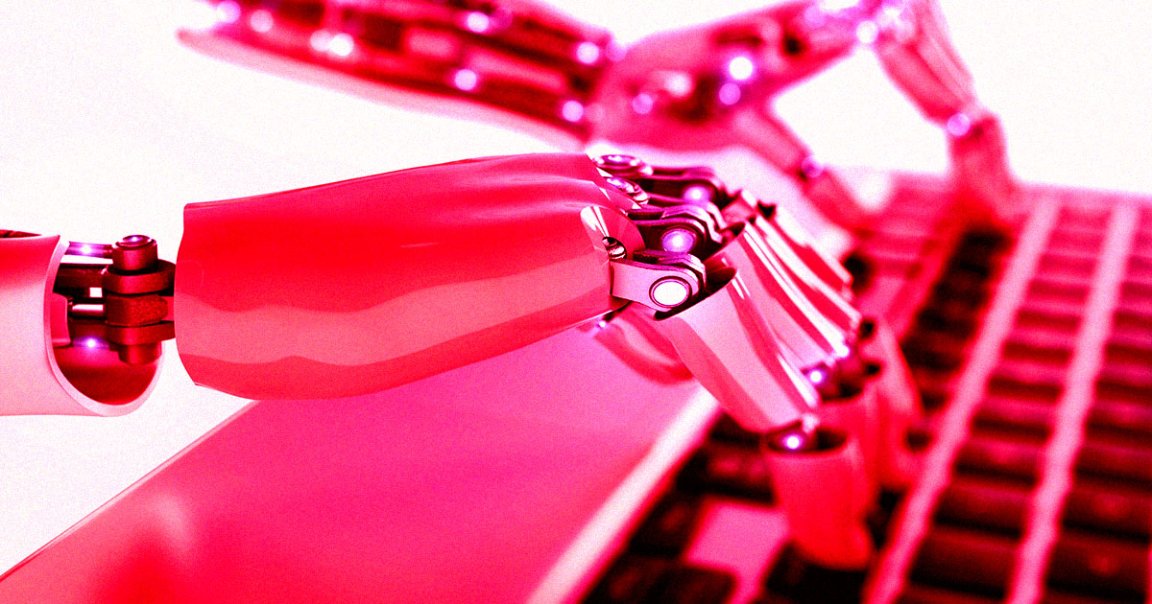
Researchers at Microsoft tried to determine which precise jobs are most and least likely to be replaced by generative AI — and the results are bad news for anyone currently enjoying the perks of a cushy desk job.
As detailed in a yet-to-be-peer-reviewed paper, the Microsoft team analyzed a “dataset of 200k anonymized and privacy-scrubbed conversations between users and Microsoft Bing Copilot,” and found that the occupations most likely to be made obsolete by the tech involve “providing information and assistance, writing, teaching, and advising.”
The team used the data to come up with an “AI applicability score,” an effort to quantify just how vulnerable each given occupation is, taking into consideration how often AI is already being used there and how successful those efforts have been.
According to the analysis, jobs most likely to be replaced include translators, historians, sales reps, writers, authors, and customer service reps. Jobs that are the safest from AI automation, in contrast, include heavy machinery and motorboat operators, housekeepers, roofers, massage therapists, and dishwashers.
In other words, the sweeping takeaway was that lower-paying and manual labor-focused occupations are far less likely to be automated than occupations that suit the expertise of large language model-based AI chatbots.
However, we should take the results with a healthy grain of salt. For one, we should consider that Microsoft employees are incentivized to paint the technology in the best light by the company’s massive investments in the space, which could lead to overstating generative AI’s capabilities.
The researchers also warn that “our data do not indicate that AI is performing all of the work activities of any one occupation,” meaning that for many gigs, AI won’t be able to take over 100 percent of tasks.
Then there’s the fact that “different people use different LLMs for different purposes” and that the nature of many jobs isn’t perfectly represented in the data. That could explain why certain jobs, such as historians, authors, and political scientists, ended up with some of the highest AI applicability scores, despite greatly relying on human intuition and expertise, and having to work with incomplete or contradictory documentation.
That’s not to mention the tech’s propensity to hallucinate made-up factual claims. That’s an inconvenient reality that hangs over the whole paper and the AI industry itself: even if the tech does end up replacing a lot of human jobs, it’s likely it will do so by providing an inferior service that we’ll just have to learn to live with.
The team also cautioned — although again, remember Microsoft’s economic interests — that replacing jobs doesn’t necessarily mean that employment or wages in a sector will decline.
“Our study explores which job categories can productively use AI chatbots,” said Kiran Tomlinson, a Senior Researcher at Microsoft who worked on the research. “It introduces an AI applicability score that measures the overlap between AI capabilities and job tasks, highlighting where AI might change how work is done, not take away or replace jobs.”
“Our research shows that AI supports many tasks, particularly those involving research, writing, and communication, but does not indicate it can fully perform any single occupation,” he continued. “As AI adoption accelerates, it’s important that we continue to study and better understand its societal and economic impact.”
The team also cautioned that “our data do not include the downstream business impacts of new technology, which are very hard to predict and often counterintuitive,” in their paper. “Take the example of ATMs, which automated a core task of bank tellers, but led to an increase in the number of bank teller jobs as banks opened more branches at lower costs and tellers focused on more valuable relationship-building rather than processing deposits and withdrawals.”
It’s a common refrain among tech companies that generative AI will lead to the creation of new types of jobs, a convenient conclusion that neatly counters ongoing narratives of imminent job losses.
But not everybody in the industry is trying to soften the blow. Earlier this month, OpenAI CEO Sam Altman warned that entire job categories could be wiped out by AI, with “some areas” in the job market, such as customer support roles, being “just like totally, totally gone.”
And Elijah Clark, a CEO who advises other company leaders on how to make use of AI, recently told Gizmodo that “CEOs are extremely excited about the opportunities that AI brings.”
“As a CEO myself, I can tell you, I’m extremely excited about it,” he added. “I’ve laid off employees myself because of AI.”
In short, while it’s an interesting glimpse into how users are making use of AI chatbots such as Microsoft’s Bing Copilot, it’s difficult to get an accurate picture of what the job market will look like in the years to come.
“Exactly which new jobs emerge, and how old ones are reconstituted, is an important future research direction in the AI age,” the researchers wrote. “At the same time, the technology itself will continue to evolve; our measurement of AI applicability is only a snapshot in time.”
“Modernizing our understanding of workplace activities will be crucial as generative AI continues to change how work is done,” they concluded.
More on AI automation: Engineer: With AI, “Anybody Whose Job Is Done on a Computer All Day Is Over… It’s Just a Matter of Time”